
Catalan, known in the Valencian Community and Carche as Valencian, is a Western Romance language. It is the official language of Andorra, and an official language of two autonomous communities in eastern Spain: Catalonia and the Balearic Islands. It is also an official language in Valencia, where it is called Valencian. It has semi-official status in the Italian comune of Alghero, and it is spoken in the Pyrénées-Orientales department of France and in two further areas in eastern Spain: the eastern strip of Aragon and the Carche area in the Region of Murcia. The Catalan-speaking territories are often called the Països Catalans or "Catalan Countries".

Catalan cuisine is the cuisine from Catalonia. It may also refer to the shared cuisine of Northern Catalonia and Andorra, the second of which has a similar cuisine to that of the neighbouring Alt Urgell and Cerdanya comarques and which is often referred to as "Catalan mountain cuisine". It is considered a part of western Mediterranean cuisine.

The Catalan Countries are those territories where the Catalan language is spoken. They include the Spanish regions of Catalonia, the Balearic Islands, Valencian Community, and parts of Aragon and Murcia (Carche), as well as the Principality of Andorra, the department of Pyrénées-Orientales in France, and the city of Alghero in Sardinia (Italy). It is often used as a sociololinguistic term to describe the cultural-linguistic area where Catalan is spoken. In the context of Catalan nationalism, the term is sometimes used in a more restricted way to refer to just Catalonia, Valencia and the Balearic Islands. The Catalan Countries do not correspond to any present or past political or administrative unit, though most of the area belonged to the Crown of Aragon in the Middle Ages. Parts of Valencia (Spanish) and Catalonia (Occitan) are not Catalan-speaking.

Josep Bargalló i Valls is a Spanish teacher and politician from Catalonia and the current Minister of Education of Catalonia.
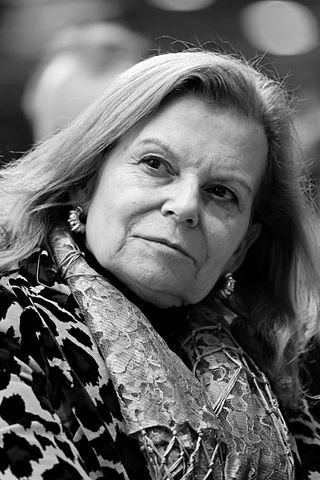
Carme Riera Guilera is a novelist and essayist. She has also written short stories, scripts for radio and television and literary criticism. She holds a doctorate in Hispanic Philology and is a professor of Spanish literature at the Universitat Autònoma de Barcelona.
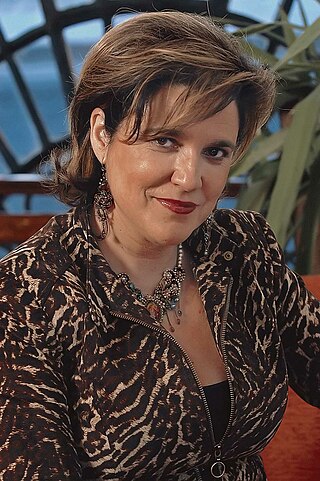
Pilar Rahola i Martínez is a Spanish journalist, writer, and former politician and MP.

Simona Škrabec is a Slovene literary critic, essayist and translator who lives and works in Barcelona. She spent her childhood in the small town of Ribnica in the region of Lower Carniola. She has lived in Barcelona since 1992. Skrabec has translated several books from Slovenian to Catalan and from Catalan to Slovenian. In addition to these two languages, she is fluent in Spanish, Serbo-Croatian, German, English and French.
Sebastià Juan Arbó was a Spanish novelist and playwright. He wrote in Catalan and Spanish. He was born in Sant Carles de la Ràpita on 27 October 1902 and died in Barcelona on 3 January 1984. His work includes novels, drama, biographies and translations. He was an honorary member of the Association of Writers in the Catalan Language. In 1948, he won the Premio Nadal.
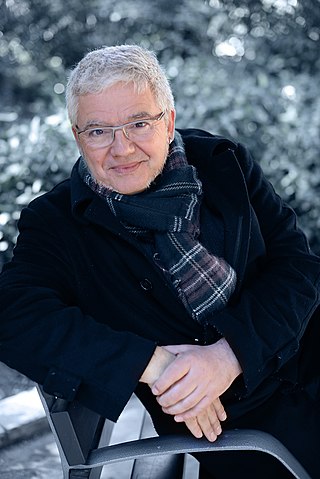
Màrius Serra i Roig is a Spanish writer, journalist, translator and television maker.

Lluís-Anton Baulenas is a Catalan novelist, translator and playwright.
Anna Aguilar-Amat is a Catalan poet, translator, researcher and university professor in Terminology and Computational Linguistics. She writes primarily in Catalan but also has some work in Spanish. She has a PHD from the Universitat Autònoma de Barcelona where she now teaches Terminology applied to Translation at the Translation Faculty. She published five collections of poems and has received several awards for Catalan poetry. Her poetic work is present in several anthologies of Catalan poets and she has been translated into Spanish, English, French, Italian, Sardinian, Macedonian, Finnish, Arabian, Turkish, Greek, German and Slovenian. She was included in the Anthology New European Poets by Wayne Miller & Kevin Prufer, Minnesota 2008.

Josep Maria Nadal i Farreras is Professor of History of Language at the University of Girona.

Maria Aurelia Capmany i Farnés was a Catalan novelist, playwright and essayist. She was also a prominent feminist cultural and anti-Franco activist.

Lluís Juste de Nin was a Spanish illustrator, cartoonist and fashion designer. He worked as creative director for the Spanish fashion label Armand Basi. His work was first published in the 1960s. His cartoons were used in the publications of the political opposition to Francisco Franco. In these publications, Juste de Nin signed his work, "El Zurdo". For many years, he was engaged in creating illustrations for articles by Manuel Vázquez Montalbán in Mundo Obrero.
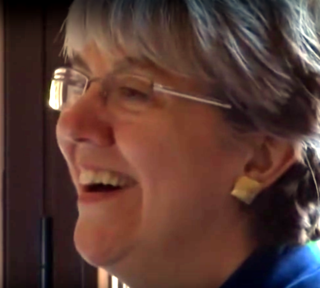
Maria Mercè Roca i Perich is a Catalan writer and politician from Spain. She was deputy to the Parliament of Catalonia for Republican Left of Catalonia, and currently serves as a councillor at the City Council of Girona for the same party.

The Royal Barcelona Trading Company to the Indies also known as the Barcelona Company was a trading company in the 18th century chartered by the Spanish crown, operating from 1755 to 1785, and which had a monopoly on trade to the Caribbean islands of Puerto Rico, Santo Domingo and Margarita. The company provided a legal framework and a focus for capital which enabled Catalan merchants to break free from the restrictions of the Cadiz monopoly on trade with the Indies, provided skills and contacts that enabled the development of free trade between Catalonia and the Americas to flourish after the company's demise, and contributed to the development of the textile industry which later became the basis of industrialisation in Catalonia.

The Catalan Republic was a state proclaimed in 1931 by Francesc Macià as the "Catalan Republic within the Iberian Federation", in the context of the proclamation of the Second Spanish Republic. It was proclaimed on 14 April 1931, and superseded three days later, on 17 April, by the Generalitat de Catalunya, the Catalan institution of self-government within the Spanish Republic.
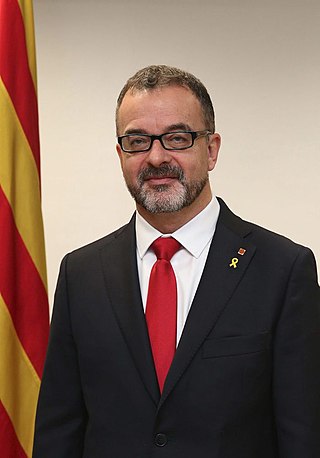
Alfred Bosch i Pascual is a Catalan academic, journalist, author, politician and a former Minister of Foreign Action, Institutional Relations and Transparency of Catalonia. He was previously a member of the Congress of Deputies of Spain and a member of Barcelona City Council.
The Ramon Llull Novel Award is an honor given annually to a novel originally written in Catalan. Conceived in 1981 by editor José Manuel Lara Hernández, it is awarded by the Planeta publishing house in conjunction with the Government of Andorra. It confers a monetary prize, originally 250,000 pesetas and now €60,000. It recognizes works of the greatest economic value in the Catalan language.

Destino was a Spanish weekly magazine published in Spain between 1937 and 1980, initially in Burgos and from 1939 in Barcelona.

















